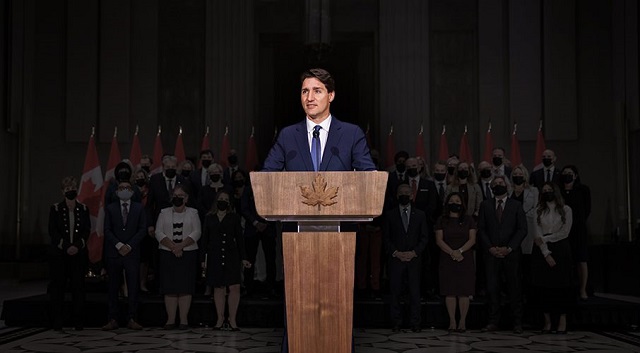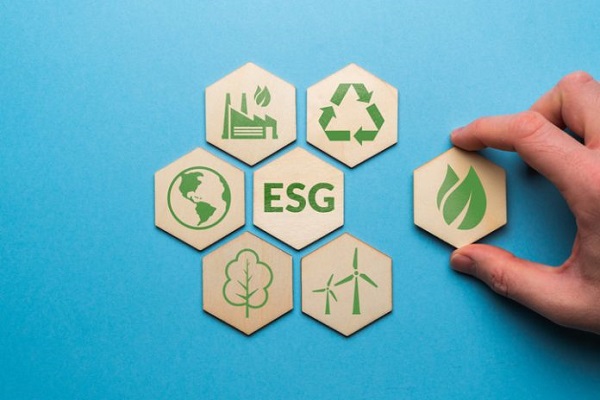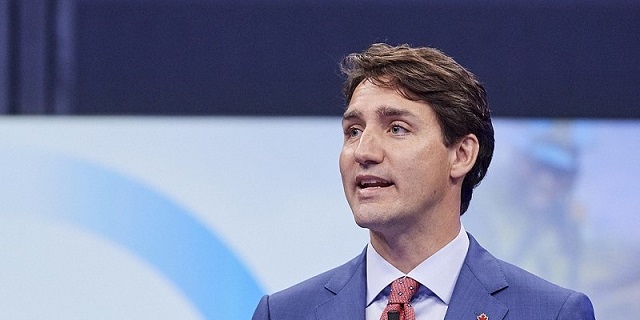Business
Trudeau launches assault on property rights to answer housing shortage

From the MacDonald Laurier Institute
By Aaron Wudrick and Jon Hartley
Liberals crack down on short-term rental owners in fiscal update — while ignoring the need for mass-scale construction of private builds
In Tuesday’s fiscal update, the Trudeau government found itself trying to bury the lede in a bad news story of bigger deficits, higher debt payments and a weakened economy.
Following a slew of opinion polls that show the Liberals trailing the opposition Conservatives by a widening margin, the update also exuded a palpable sense of urgency as the government scrambles to address a critical issue on which they were caught completely off guard: housing.
Housing has emerged, in recent months, as arguably the single biggest political concern in Canada. It impacts middle- and lower-income Canadians most severely and is a significant part of why the Liberals have been bleeding support amongst these key constituencies, which disproportionately include younger Canadians.
In response to their slide in the polls, the Liberals have belatedly started to act on the file — by removing the GST on new rental builds and dedicating $4 billion to a housing accelerator program that aims to incentivize municipalities to remove prohibitive zoning barriers. The fiscal update boasted that this fund has already signed agreements with nine cities to build 21,000 homes over the next three years, which sounds impressive until you consider that Canada needs approximately 3.5 million new homes by 2030 to fix the affordability crisis.
While any new housing supply will be welcome, the measures amount to knee-jerk reactions by a government that tries to solve problems by hastily showering them with money. While the Housing Accelerator Fund correctly focuses on scrapping restrictive zoning, the real goal should be to incentivize the construction of privately built housing on a mass scale, rather than simply subsidize additional public housing. The real cause of Canada’s housing shortage is not market failure but a series of policy failures on multiple fronts and levels.
Perhaps most alarming is the government’s assault on short-term rental housing by reducing tax deductions available to property owners, framed as a crusade against greedy landlords profiting from tourists while everyday Canadians scramble to keep a roof over their heads. The implicit assumption seems to be that, by making short-term rentals less attractive, these units will be magically transformed into long-term rental accommodations (which is wishful thinking, to say the least). In so doing, the government overlooks the diverse array of reasons Canadians choose to rent out properties on a short-term basis.
Flexibility — as facilitated by platforms like Airbnb — is essential for those who do not wish to commit to full-time landlord responsibilities. Additionally, Canadians may have family members who intermittently require housing, such as aging parents or university students. Long-term tenancy, burdened with compliance issues and eviction challenges, is unappealing to many property owners. If the government instead chose to make the work of a landlord more attractive, it wouldn’t need to make short-term rentals less appealing.
Even more troubling is the broader trend of the government encroaching on Canadians’ property rights, ostensibly to compensate for its own housing policy failures. Dictating how citizens use their own property raises serious concerns about the government overstepping its bounds. In a country with well-established property rights, it is inappropriate and misguided for the government to meddle in the choices of families seeking to make ends meet by renting out their properties.
On a practical level, the government’s chosen channels to tackle housing — relying on more government subsidies, undermining the short-term rental market, discouraging institutional investors from buying single-family homes and foreign buyer taxes or bans — will ultimately be too small to meaningfully grow the total stock of housing but will cause a number of harmful unintended consequences.
The bottom line is this: to make any kind of impact on housing affordability at scale, especially for individuals living below the median income, Canada needs a much larger housing supply — and the amount of capital investment this requires can only come from private developers.
All in all, the fiscal update shows the slapdash nature of the Trudeau government’s frantic attempts to address housing concerns, as well as its unfortunate inclination to resort to heavy-handed interventions, particularly in the realm of short-term rentals. The government’s indifference to infringing on private property rights underscores the need for a more supply-oriented approach to housing policy — one that works with, rather than against, the rights of property owners.
Aaron Wudrick is the domestic policy director at the Macdonald-Laurier Institute.
Jon Hartley is a senior fellow at the Macdonald-Laurier Institute and a research fellow at the Foundation for Research on Equal Opportunity.
Business
Ottawa should end war on plastics for sake of the environment

From the Fraser Institute
Here’s the shocker: Meng shows that for 15 out of the 16 uses, plastic products incur fewer GHG emissions than their alternatives…
For example, when you swap plastic grocery bags for paper, you get 80 per cent higher GHG emissions. Substituting plastic furniture for wood—50 per cent higher GHG emissions. Substitute plastic-based carpeting with wool—80 per cent higher GHG emissions.
It’s been known for years that efforts to ban plastic products—and encourage people to use alternatives such as paper, metal or glass—can backfire. By banning plastic waste and plastic products, governments lead consumers to switch to substitutes, but those substitutes, mainly bulkier and heavier paper-based products, mean more waste to manage.
Now a new study by Fanran Meng of the University of Sheffield drives the point home—plastic substitutes are not inherently better for the environment. Meng uses comprehensive life-cycle analysis to understand how plastic substitutes increase or decrease greenhouse gas (GHG) emissions by assessing the GHG emissions of 16 uses of plastics in five major plastic-using sectors: packaging, building and construction, automotive, textiles and consumer durables. These plastics, according to Meng, account for about 90 per cent of global plastic volume.
Here’s the shocker: Meng shows that for 15 out of the 16 uses, plastic products incur fewer GHG emissions than their alternatives. Read that again. When considering 90 per cent of global plastic use, alternatives to plastic lead to greater GHG emissions than the plastic products they displace. For example, when you swap plastic grocery bags for paper, you get 80 per cent higher GHG emissions. Substituting plastic furniture for wood—50 per cent higher GHG emissions. Substitute plastic-based carpeting with wool—80 per cent higher GHG emissions.
A few substitutions were GHG neutral, such as swapping plastic drinking cups and milk containers with paper alternatives. But overall, in the 13 uses where a plastic product has lower emissions than its non-plastic alternatives, the GHG emission impact is between 10 per cent and 90 per cent lower than the next-best alternatives.
Meng concludes that “Across most applications, simply switching from plastics to currently available non-plastic alternatives is not a viable solution for reducing GHG emissions. Therefore, care should be taken when formulating policies or interventions to reduce plastic demand that they result in the removal of the plastics from use rather than a switch to an alternative material” adding that “applying material substitution strategies to plastics never really makes sense.” Instead, Meng suggests that policies encouraging re-use of plastic products would more effectively reduce GHG emissions associated with plastics, which, globally, are responsible for 4.5 per cent of global emissions.
The Meng study should drive the last nail into the coffin of the war on plastics. This study shows that encouraging substitutes for plastic—a key element of the Trudeau government’s climate plan—will lead to higher GHG emissions than sticking with plastics, making it more difficult to achieve the government’s goal of making Canada a “net-zero” emitter of GHG by 2050.
Clearly, the Trudeau government should end its misguided campaign against plastic products, “single use” or otherwise. According to the evidence, plastic bans and substitution policies not only deprive Canadians of products they value (and in many cases, products that protect human health), they are bad for the environment and bad for the climate. The government should encourage Canadians to reuse their plastic products rather than replace them.
Author:
Business
ESG Puppeteers

From Heartland Daily News
By Paul Mueller
The Environmental, Social, and Governance (ESG) framework allows a small group of corporate executives, financiers, government officials, and other elites, the ESG “puppeteers,” to force everyone to serve their interests. The policies they want to impose on society — renewable energy mandates, DEI programs, restricting emissions, or costly regulatory and compliance disclosures — increase everyone’s cost of living. But the puppeteers do not worry about that since they stand to gain financially from the “climate transition.”
Consider Mark Carney. After a successful career on Wall Street, he was a governor at two different central banks. Now he serves as the UN Special Envoy on Climate Action and Finance for the United Nations, which means it is his job to persuade, cajole, or bully large financial institutions to sign onto the net-zero agenda.
But Carney also has a position at one of the biggest investment firms pushing the energy transition agenda: Brookfield Asset Management. He has little reason to be concerned about the unintended consequences of his climate agenda, such as higher energy and food prices. Nor will he feel the burden his agenda imposes on hundreds of millions of people around the world.
And he is certainly not the only one. Al Gore, John Kerry, Klaus Schwab, Larry Fink, and thousands of other leaders on ESG and climate activism will weather higher prices just fine. There would be little to object to if these folks merely invested their own resources, and the resources of voluntary investors, in their climate agenda projects. But instead, they use other people’s resources, usually without their knowledge or consent, to advance their personal goals.
Even worse, they regularly use government coercion to push their agenda, which — incidentally? — redounds to their economic benefit. Brookfield Asset Management, where Mark Carney runs his own $5 billion climate fund, invests in renewable energy and climate transition projects, the demand for which is largely driven by government mandates.
For example, the National Conference of State Legislatures has long advocated “Renewable Portfolio Standards” that require state utilities to generate a certain percentage of electricity from renewable sources. The Clean Energy States Alliance tracks which states have committed to moving to 100 percent renewable energy, currently 23 states, the District of Columbia, and Puerto Rico. And then there are thousands of “State Incentives for Renewables and Efficiency.”
Behemoth hedge fund and asset manager BlackRock announced that it is acquiring a large infrastructure company, as a chance to participate in climate transition and benefit its clients financially. BlackRock leadership expects government-fueled demand for their projects, and billions of taxpayer dollars to fund the infrastructure necessary for the “climate transition.”
CEO Larry Fink has admitted, “We believe the expansion of both physical and digital infrastructure will continue to accelerate, as governments prioritize self-sufficiency and security through increased domestic industrial capacity, energy independence, and onshoring or near-shoring of critical sectors. Policymakers are only just beginning to implement once-in-a-generation financial incentives for new infrastructure technologies and projects.” [Emphasis added.]
Carney, Fink, and other climate financiers are not capitalists. They are corporatists who think the government should direct private industry. They want to work with government officials to benefit themselves and hamstring their competition. Capitalists engage in private voluntary association and exchange. They compete with other capitalists in the marketplace for consumer dollars. Success or failure falls squarely on their shoulders and the shoulders of their investors. They are subject to the desires of consumers and are rewarded for making their customers’ lives better.
Corporatists, on the other hand, are like puppeteers. Their donations influence government officials, and, in return, their funding comes out of coerced tax dollars, not voluntary exchange. Their success arises not from improving customers’ lives, but from manipulating the system. They put on a show of creating value rather than really creating value for people. In corporatism, the “public” goals of corporations matter more than the wellbeing of citizens.
But the corporatist ESG advocates are facing serious backlash too. The Texas Permanent School Fund withdrew $8.5 billion from Blackrock last week. They join almost a dozen state pensions that have withdrawn money from Blackrock management over the past few years. And last week Alabama passed legislation defunding public DEI programs. They follow in the footsteps of Florida, Texas, North Carolina, Utah, Tennessee, and others.
State attorneys general have been applying significant pressure on companies that signed on to the “net zero” pledges championed by Carney, Fink, and other ESG advocates. JPMorgan and State Street both withdrew from Climate Action 100+ in February. Major insurance companies started withdrawing from the Net-Zero Insurance Alliance in 2023.
Still, most Americans either don’t know much about ESG and its potential negative consequences on their lives or, worse, actually favour letting ESG distort the market. This must change. It’s time the ESG puppeteers found out that the “puppets” have ideas, goals, and plans of their own. Investors, taxpayers, and voters should not be manipulated and used to climate activists’ ends.
They must keep pulling back on the strings or, better yet, cut them altogether.
Paul Mueller is a Senior Research Fellow at the American Institute for Economic Research. He received his PhD in economics from George Mason University. Previously, Dr. Mueller taught at The King’s College in New York City.
Originally posted at the American Institute for Economic Research, reposted with permission.
-

 Brownstone Institute16 hours ago
Brownstone Institute16 hours agoMedical Elites’ Disgrace Over Ivermectin
-

 National14 hours ago
National14 hours agoDespite claims of 215 ‘unmarked graves,’ no bodies have been found at Canadian residential school
-

 Brownstone Institute9 hours ago
Brownstone Institute9 hours agoThe WHO’s Proposed Pandemic Agreements Worsen Public Health
-

 John Stossel3 hours ago
John Stossel3 hours agoProtecting Free Speech: The Early Warning Signs From Around The World
-

 COVID-196 hours ago
COVID-196 hours agoTrudeau’s public health agency recommends another experimental COVID booster
-

 COVID-1910 hours ago
COVID-1910 hours agoThe New York Times Admits Injuries from COVID-19 Shots
-

 Health7 hours ago
Health7 hours agoTHE WPATH TAPES: Behind-The-Scenes Recordings Reveal What Top Gender Doctors Really Think About Sex Change Procedures
-

 Automotive21 hours ago
Automotive21 hours agoElectric vehicle mandates mean misery all around



